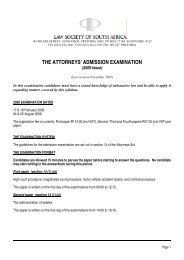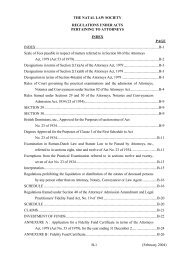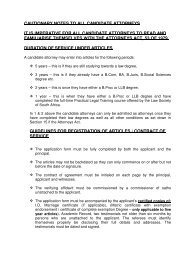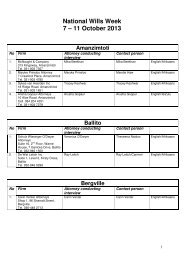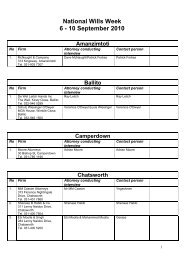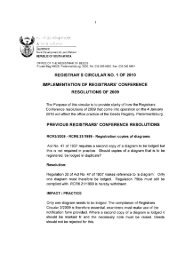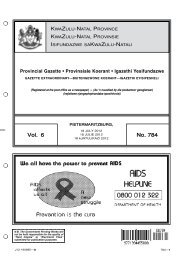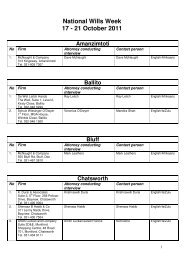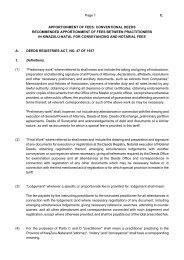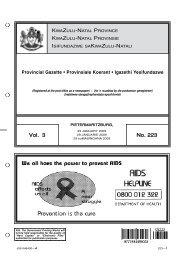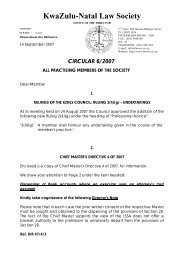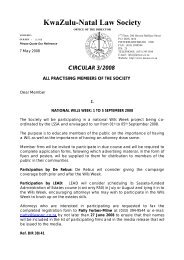a.1 - Natal Law Society
a.1 - Natal Law Society
a.1 - Natal Law Society
You also want an ePaper? Increase the reach of your titles
YUMPU automatically turns print PDFs into web optimized ePapers that Google loves.
AGM MINUTES - 3 - 12 OCTOBER 2012<br />
-------------------------------------------------------------------------------------------------------------<br />
At the Access to Justice Conference in July 2011 a monitoring committee led by former<br />
Chief Justice Sandile Ngcobo and the current Chief Justice Mogoeng was established. A<br />
subcommittee called the Judicial Case <strong>Law</strong> Management Committee was appointed with its<br />
objective being the task of stemming the tide of delays in the disposal of cases in the High<br />
Court<br />
The Judicial Case <strong>Law</strong> Management Committee is the key driver of case management in the<br />
High Courts, the DP being the current chair.<br />
The Committee has set up a pilot project which would commence at three pilot sites,<br />
KwaZulu-<strong>Natal</strong> High Court, the North and South Gauteng High Court and the Western Cape<br />
High Court. The intention being to introduce in these Courts a working model which will see<br />
a more efficient and effective streamlining of the flow of cases so as to reduce delays to a<br />
minimum.<br />
At the moment the pre-hearing phase of a particular case is firmly located in the clerk or<br />
registrar’s office or at the legal practitioner’s office or that of a prosecuting authority, as<br />
the case may be. It is these officers or entities that dictate the pace of litigation or the<br />
conduct of the criminal case.<br />
The Rules of Court as presently structured do not effectively allow a judicial officer to take<br />
control of a case before him or her at the earliest possible opportunity. For this reason the<br />
Judicial Case <strong>Law</strong> Management Committee has come up with practice directives as an<br />
option; these will of course need to be embraced by the Judges, the legal practitioners and<br />
all the other relevant stakeholders. The Committee does not see them as being in conflict<br />
with the rules but rather as short-terms aids aimed at achieving a quicker, effective and a<br />
more efficient way of dealing with cases in keeping with the objectives of the Constitution.<br />
The DP stated that it is envisioned that at some time in the future the rules will be<br />
amended to provide for case management. Under the present rules in civil cases, the prehearing<br />
phase commences with the pleadings in which issues between the parties are<br />
identified and defined. This is then followed by a sometimes tedious exchange of processes<br />
before the matter is finally placed before a judicial officer for trial. Ideally a Judge should<br />
be involved at the earliest possible opportunity so as to enable him or her to play some role<br />
in the identification of the issues in dispute and cut out unnecessary issues which may cause<br />
delays in the disposal of cases.<br />
The Committee has proposed inter alia the following:<br />
‣ A case should be allocated to a Judge upon the signing of an action or application.<br />
‣ A case schedule should be implemented.<br />
‣ Continuous judicial control over a case through judicial officers’ support staff should<br />
be maintained.




